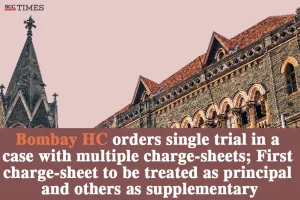Bombay High Court: The present petition challenged the order passed by the Sessions Court which had held the five different charge-sheet as maintainable even though the said charge-sheets arose from same transaction and against same accused and formed the basis for the registration of 5 different cases. A Single Judge Bench of Valmiki Menezes, J., held that as per the provisions of Section 220 of Criminal Procedure Code, 1973 (‘CrPC’) the Sessions Court shall try all five charge-sheets under one trial at which witnesses arraigned in all five charge-sheets shall be examined in a single trial. It was opined that the first charge-sheet shall be treated as principal charge-sheet while the other as supplementary. Thus, the Court opined that the Sessions Court had no reason to register separate cases by the bifurcation of the charge-sheet and accordingly, quashed and set aside the order passed by the Sessions Court.
Background
An FIR was registered by the Economic Offences Cell of the Goa Police based on the complaint filed by six depositors. After the investigation, a charge-sheet was filed before the Sessions Court. Immediately thereafter, 35 more depositors alleged a similar crime which was registered before the Economic Offences Cell which culminated in filing of another Final Report before the Sessions Court.
During the course of hearing of these matters, on the oral directions of the Sessions Court, the Investigating Officer bifurcated Charge-sheet 2 into three more charge-sheets and the same came to be registered by the Sessions Court. Thus, a total of five charge-sheets were pending before the Court, which were the offshoots of Charge-sheet 1. In all these charge-sheets, the accused have been charged for committing offences under Section 406, 409, 468, 420 read with Section 34 of the Penal Code, 1860 (‘IPC’) and Sections 3 and 5 of the Goa Protection of Interests of Depositors (in Financial Establishments) Act, 1999.
Thus, the accused filed the applications in the aforementioned cases which sought for the declaration of the cases as not maintainable due to the bifurcation of the charge-sheet as the all the cases were connection or arose out of same transaction. The said applications were rejected by the Sessions Court stating that the bifurcated charge-sheets arose from one original FIR, and one original charge-sheet.
Aggrieved by the same the accused filed the writ petition before the present Court.
Analysis, Law and Decision
The Court noted that the main contention of the accused was that considering the provisions of Section 220 of the Criminal Procedure Code, 1973 (‘CrPC’), there could not be any bifurcation of the charge-sheets because even though the other charge-sheets arose from multiple transactions of different investors, they were related to the same offences.
The Court also noted that Economic Offences Cell had also registered a complaint under Section 3, 4 and 45 of the Prevention of Money Laundering Act, 2002 (PMLA) against the very same accused and this case was also pending before the Sessions Court.
The Court observed that the Sessions Court had bifurcated the Charge-sheet No. 2 into three more charge-sheets, without any reason, which was diametrically opposed to the precedent laid down by the Supreme Court in the case of Abhishek Singh Chauhan v. Union of India, 2022 SCC OnLine SC 1936. The Court opined that the provision of Section 220 of CrPC would specifically apply to the offences covered by the Charge-sheet No. 1 to 5 as the alleged offences in all the charge-sheets were exactly the same, and against a common accused.
The Court applied the principle laid down by the Supreme Court in the abovementioned case and opined that since the multiple charge-sheets were filed on similar transactions, the first charge- sheet shall be treated as the principle charge-sheet and all subsequent charge-sheets shall be treated as supplementary charge-sheets to the first charge-sheet. Furthermore, the Court opined that all the charge-sheets would necessarily have to be tried under one trial at which witnesses arraigned in each of the supplementary charge-sheets and the witnesses in the main charge-sheet are to be examined, in one single trial. Therefore, in the instant case, Charge-sheet No.1 shall be treated as the principal charge-sheet, whilst Charge-sheet Nos. 2 to 5, shall be treated as supplementary charge-sheets to Charge-sheet No.1.
Accordingly, the Court held that the Sessions Court shall try all five charge-sheets under one trial at which witnesses arraigned in all five charge-sheets shall be examined in a single trial as all the cases were arising from one single charge-sheet and the offences alleged and the accused in all the charge-sheets were same. Thus, the first charge-sheet shall be treated as principal charge-sheet while the other as supplementary. Therefore, the Court quashed and set aside the order passed by the Sessions Court. Additionally, the Court held that since the PMLA case registered against the accused, was founded upon a predicate offence therefore, it shall be heard immediately after the concluding the trial of the case formed by clubbing those 5 charge-sheets filed against the accused.
[Ameet Savant v. State of Goa, 2025 SCC OnLine Bom 3608, decided on: 30-9-2025]
Advocates who appeared in this case:
Advocate for the Petitioner- Gaurish Agni, Yash Naik, Madhav Cuncoliencar, Kishan Kavlekar, Ruchika Mishra and Leandra Lorreia, Advocates
Advocate for the Respondents- Somnath Karpe, Addl. Public Prosecutor; Kiran Pai, Advocate


